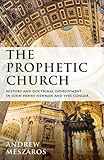The prophetic church : history and doctrinal development in John Henry Newman and Yves Congar / Andrew Meszaros.
Material type: TextPublication details: Oxford : Oxford University Press, ©2016.Description: xiii, 268 p. ; 25 cmISBN:
TextPublication details: Oxford : Oxford University Press, ©2016.Description: xiii, 268 p. ; 25 cmISBN: - 9780198786344
- 0198786344
- BQ 7409.O64.M47 2016
| Item type | Current library | Call number | Status | Barcode | |
|---|---|---|---|---|---|
 Corsi/Seminari
Corsi/Seminari
|
Biblioteca "Angelicum" Pont. Univ. S.Tommaso d'Aquino Temporary Library | BQ 7409.O64.M47 2016 (Browse shelf(Opens below)) | Available | 0030197171 |
Browsing Biblioteca "Angelicum" Pont. Univ. S.Tommaso d'Aquino shelves, Shelving location: Temporary Library Close shelf browser (Hides shelf browser)
| No cover image available | No cover image available | No cover image available |

|

|

|

|
||
| BQ 7409.O64.K93 2002 The general characteristics of the sacraments of the Church in the writings of Yves Congar / | BQ 7409.O64 M3 Dogme et vie spirituelle / | BQ 7409.O64 M3 Ecclesia ab Abel / | BQ 7409.O64.M47 2016 The prophetic church : history and doctrinal development in John Henry Newman and Yves Congar / | BQ 7409.O64.M8.E5 My journal of the Council / | BQ 7409.O64.M83 2016 The role and function of charism in the theology of Yves Congar / | BQ 7409.O64 P9 Une vie pour la vérité : Jean Puyo interroge le Père Congar. |
Include bibliografia (p. 245-261) e indice.
The Prophetic Church: History and Doctrinal Development in John Henry Newman and Yves Congar is a historical and a systematic account of tradition, doctrinal development, and the theology of history, with a particular focus on the contributions of two modern Catholic figures, John Henry Newman (1801-1890) and Yves Congar (1904-1995). It is structured around two overarching themes: the 'subject' and 'history' in their relationship to doctrinal development. In addition, the thought of both Congar and Newman is interwoven throughout. Andrew Meszaros contextualizes and surveys Congar's reception of Newman. He explains the appeal of Newman and provide concrete evidence that would substantiate the nature and extent of Newman's influence on Congar, and thereby indirectly, on Vatican II. Meszaros also discusses doctrinal development with special attention to the subject and history. These treatments are based on the subjective and historical 'motors' or 'causes', as it were, of doctrinal development. He then develops a theology of doctrine and doctrinal development as inspired by Newman and Congar. 0In its reflection on the meaning of the Doctrinal Economy, this study contributes to the theological problem of history and doctrine by synthesizing and honing contributions of these two great thinkers of modern Catholic theology. It is precisely some of the key differences between Newman and Congar that make it theologically enriching to study them together.


